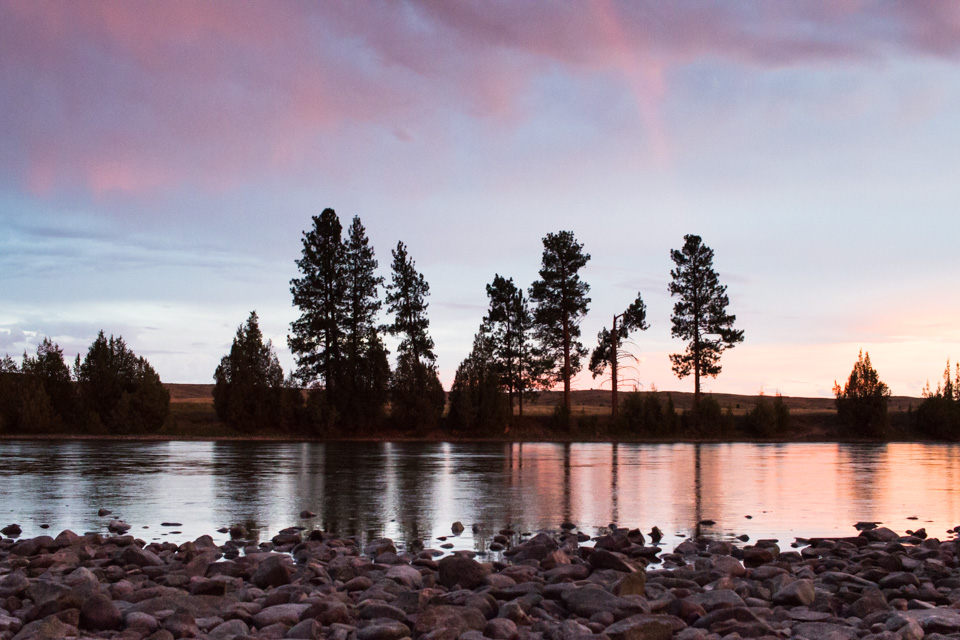
When I was a kid, I thought the best thing to be was a poet. I would write simple, horrible poems and ask my mom to edit them for me. She was kind enough to point out maybe one in seven of my spelling and grammatical errors, always encouraging my reflections. All of these poems were inspired by my adventures in my backyard or just beyond. My world was small, but I knew all of it. Gary Snyder describes these adventures, “The childhood landscape is learned on foot, and a map is inscribed in the mind going out wider and farther.” Though this landscape was inscribed inside me, I would argue it was etched not in my mind but in my heart.
It is strange that now, as I am paddling down the Flathead River, I have been doing these explorations outward over a decade later. We passed my childhood home near Whitefish, drove through the town I inhabited as a teenager, and caught a glimpse of my first college as we drove through Kalispell. This journey will end in Missoula; the place I now call home.
In many ways, I feel as much a child in this place now as when I grew up here. I have spent care free summer afternoons laughing and playing Sharks and Minnows in river waters with my peers, I have knelt down in forest floors to peer under mushrooms, overcome with the same magic I felt as a child that inspired me to look for fairies. In evening walks around our camps in the Jumbo valley, I have felt indescribably small in the face of great mountains. Throughout this journey, I have been more present for each moment, I have been curious about and moved by the natural world around me, and I have rediscovered my childlike sense of wonder.
My experiences here have also reminded me of what I later thought was the best thing to be: an outdoors-woman. And through WRFI a better outdoors-person I have become. The trees, flowers, and shrubs are familiar to me, and in recognizing them I feel in on “the gossip of the place,” as Gary Snyder would say. I am happy to see fields dotted with the bright scarlet paintbrush, and I feel greeted and welcomed by the waves of trembling aspen. I now need no trail to find my way, only some mountains and a map.
It was not long before my outdoor pursuits led to environmental ones. As I fumbled through my introductions to being an outdoor recreationalist, I bled many times into the mountains. I found those mountains bled back into me, and I found wild places became essential to me in some way, and their protection even more so. For years, I have been studying the methods of environmental protection at my university, been steeping myself in the sciences relating to natural resources. Western science is analytical and without passion, ideology, or emotion. Without realizing it, I have been seeking to find ways to justify my love for the wild through this language and in ways that fit nicely into these boxes.
This is where WRFI has taught me my greatest lesson. This experience has been a demonstration and practice of a science that is passionate, emotional, and idealistic. We have spoken to countless people whose lives are devoted to the protection of natural spaces because they feel within themselves that without them they are diminished. John Fredrick, founder of the North Fork Preservation Association, spent years advocating for the protection of the Flathead Valley because he believed its beauty was worth more than any coal that could be harvested from its grounds. Debbo Powers and other residents of the area now speak with reverence about this place they live in and love, and it is this bias that drives them. With them, and with each of our speakers, they are driven by passion and their hearts are clearly in their work.
Every paddle stroke now takes me toward home. Soon, I will unpack all the physical things I’ve carried these six weeks, but some of the insights I’ve picked up I’ll never put away. I don’t know anymore what the best thing to be is, if I’m thinking about careers. But I do know the best things I’ve been are present, passionate, and full of awe. That the best place to read poetry is in a quiet forest, and if in being on a mountain top overwhelms me with a joy so immense it brings me to tears, then that is reason enough to protect it.
The best thing I can ever be is where my heart is.
One Reply to “Lauren O’Laughlin: Where the Heart Is”
Comments are closed.
What beautiful words <3